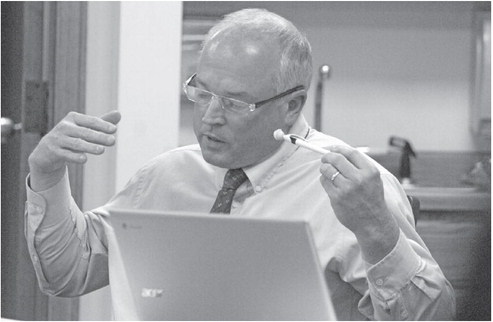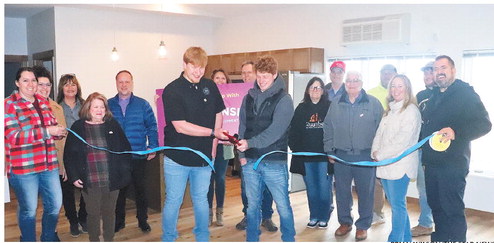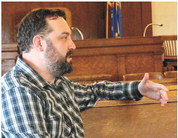Medford schools eye pay boost to attract workers


Teachers and staff at Medford school district could see a pay bump in next year’s budget as the district works to be competitive on wages to attract and retain workers.
District finance director Audra Brooks presented a preliminary budget to the members of the school district finance committee on Monday evening that looks to keep overall spending level. School districts operate on the same budget year as the state with the new budget year beginning on July 1 in one calendar year and ending June 30 in the following calendar year.
While keeping overall spending flat, Brooks presented an administration plan to raise base wages at the support staff and certified staff levels.
Like many employers, Brooks said the district is having a hard time getting people to come and work there especially in support staff positions. “They start and quit in the same couple weeks,” Brooks said.
The district’s current base wage is $12.25 per hour for support staff positions which include teachers aides, secretarial staff with slightly higher pay for custodians. Brooks proposed increasing that base wage amount by 50 cents per hour and continuing that increase across all the cells of the district’s pay scale. What this will mean is that all staff members will see a bump in pay along with any longevity increases. This will amount to about an 80 cents per hour increase for existing support staff.
Buildings and grounds director Dave Makovsky told committee members he currently has three open custodian positions because of inability to hire people at the wages the district has set. He said he is seeing starting wage competition with places like Nestle Pizza, Sierra Pacific and Weather Shield. “They are being approached and offered $16 to $17 per hour to start,” Makovsky said.
“I don’t see how we cannot do it,” said board member Steve Deml of the need be competitive to keep workers.
The impact of increases for support staff would be to raise wages in the district budget by about $76,000, Brooks said.
On the certified staff level, which includes teachers and other salaried staff positions, Brooks proposed a $500 increase to the base salary which would go through all cells of the pay scale. Under the pay scale, a teacher would typically see a longevity increase of $1,100 from one year to the next, the additional $500 would raise that to $1,600 in next school year’s budget.
The current base salary for a starting teacher in the district is $39,500. “It is hard to get someone at that wage,” Brooks said, noting the statewide shortage in teachers. The increase for certified staff would add $129,000 in annual payroll expenses.
No increases were specified for the administrative level, however, past practice in the district has been to match the percentage increase from certified staff levels. Brooks noted the increase being proposed is 3.45% for certified staff.
“Just because the CPI is 4.7% we don’t have to meet it,” Brooks said of the inflationary jump which occurred in the past year.
“I don’t think it is enough in either case,” said board member Brian Hallgren, expressing a desire to build bigger raises into next year’s budget. At the same time, Hallgren advocated for fiscal prudence going forward.
“We have to be super careful going forward in terms of adding staff,” he said.
In the last state budget no new dollars were put toward school funding and instead local school boards were told to use their ESSER federal COVID-19 grant funds to cover operating expenses. This puts districts across the state facing a potential fiscal cliff unless changes are made in the next state budget.
District administrator Pat Sullivan agreed that the future was uncertain, but said it would be premature to act today to address the possibility of a future shortfall.
He said that if in the next biennial budget the dollars are not there, the district, and others around the state, would be looking at making major cuts. He said the districts have been forced by the legislature to use ESSER dollars for operation costs.
“We have good people and we want to keep them,” said board president Dave Fleegel, supporting the need to be competitive with other employers.
With benefits and employer-paid taxes factored into the increases, the proposed changes to the pay scale would add about $250,000 to the budget.
Sullivan said they had looked at other dollar amounts for possible increases but the amount requested came down to what administration felt the district’s budget could afford.
Finance committee members voted to support the pay scale changes and they went before the full school board for additional discussion later that night.
At the school board meeting, board member Don Everhard came out strongly in support of raising the base wages for teachers. He gave the example of his son applying for jobs around the state and the starting wages were much higher for new teachers.
“We are definitely going to have to increase the starting salary,” he said, noting that even the $500 increase to the base would keep Medford on the low side of starting salaries.
“We would love to have the money to do more,” Sullivan said, noting that any increases become a domino effect with the need to pay second year teachers more than first year teachers and so on. “We would like to find more and pay people more,” he said.
“Are we competitive?” Everhard asked. “I would like to think we are attracting the best.”
“We are trying,” Brooks said, noting that it still doesn’t match the consumer price index increase, but gets the district closer.
Hallgren repeated his concerns about it not being enough while at the same time calling for the district to be aware that the money may not be there to cover these wages in the future.
“What is the impact longterm,” he asked, noting that 65% of the district’s budget is in payroll expense.
Including the increases in the budget planning at this point does not guarantee raises will occur since the budget is not finalized by the board until early summer and even then remains subject to formal approval by electors at the annual meeting.
An ongoing challenge for Medford and other districts is the situation of using federal grant dollars to pay for operational costs. “There isn’t a district superintendent or business manager that supports using one time money for ongoing costs, but that is what they told us to do,” Sullivan said of the legislature’s direction to fill budget dollars with grant funds.
He said if the district came to having a shortfall with no relief from the state legislature, they would have the option of huge cuts or going to referendum to exceed the revenue limits. Sullivan was quick to note that in his time in Medford the district has never sought additional operational revenue referendums from taxpayers. Fleegel agreed, noting the district has made deep cuts when necessary.
Acknowledging the potential for uncertainty in future years, board members voted to approve the new pay scale with the increases so that Brooks can include it into the budget preparation process.




